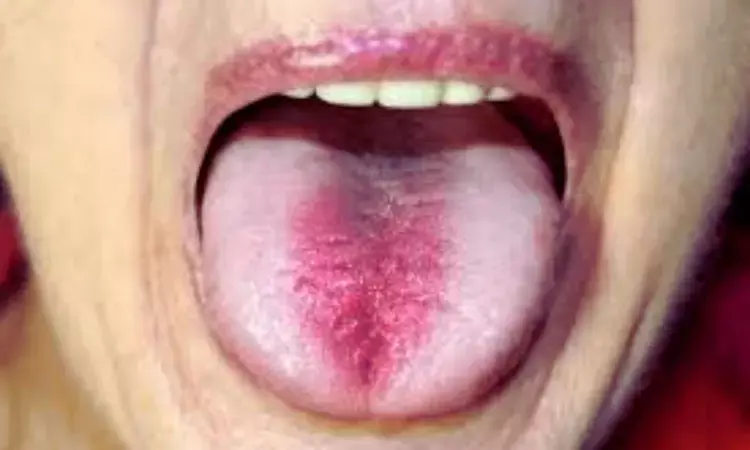- Home
- Medical news & Guidelines
- Anesthesiology
- Cardiology and CTVS
- Critical Care
- Dentistry
- Dermatology
- Diabetes and Endocrinology
- ENT
- Gastroenterology
- Medicine
- Nephrology
- Neurology
- Obstretics-Gynaecology
- Oncology
- Ophthalmology
- Orthopaedics
- Pediatrics-Neonatology
- Psychiatry
- Pulmonology
- Radiology
- Surgery
- Urology
- Laboratory Medicine
- Diet
- Nursing
- Paramedical
- Physiotherapy
- Health news
- Fact Check
- Bone Health Fact Check
- Brain Health Fact Check
- Cancer Related Fact Check
- Child Care Fact Check
- Dental and oral health fact check
- Diabetes and metabolic health fact check
- Diet and Nutrition Fact Check
- Eye and ENT Care Fact Check
- Fitness fact check
- Gut health fact check
- Heart health fact check
- Kidney health fact check
- Medical education fact check
- Men's health fact check
- Respiratory fact check
- Skin and hair care fact check
- Vaccine and Immunization fact check
- Women's health fact check
- AYUSH
- State News
- Andaman and Nicobar Islands
- Andhra Pradesh
- Arunachal Pradesh
- Assam
- Bihar
- Chandigarh
- Chattisgarh
- Dadra and Nagar Haveli
- Daman and Diu
- Delhi
- Goa
- Gujarat
- Haryana
- Himachal Pradesh
- Jammu & Kashmir
- Jharkhand
- Karnataka
- Kerala
- Ladakh
- Lakshadweep
- Madhya Pradesh
- Maharashtra
- Manipur
- Meghalaya
- Mizoram
- Nagaland
- Odisha
- Puducherry
- Punjab
- Rajasthan
- Sikkim
- Tamil Nadu
- Telangana
- Tripura
- Uttar Pradesh
- Uttrakhand
- West Bengal
- Medical Education
- Industry
Significantly Higher Salivary Opiorphin Concentrations Linked to Burning Mouth Syndrome, Study Reveals

Iran: A recent study published in Clinical & Experimental Dental Research found that salivary opiorphin levels are elevated in patients with Burning Mouth Syndrome (BMS) compared to healthy individuals. Additionally, a majority of BMS patients report experiencing anxiety and depression.
Burning Mouth Syndrome is a chronic intraoral burning sensation lasting over 2 hours daily for at least 3 months, often accompanied by oral dryness, taste changes, and dysesthesia. Its global prevalence is 1.73%, rising to 8% among clinical patients, predominantly affecting middle-aged and elderly women. Psychological factors, anxiety, depression, and neuropathy are linked to BMS, though its exact cause remains unclear. Misdiagnosis and improper treatment can worsen symptoms, highlighting the need for multidisciplinary care.
No specific paraclinical parameters exist for diagnosing Burning Mouth Syndrome, which relies solely on clinical findings. Recent studies suggest that opiorphin, a natural analgesic in saliva, may influence BMS by modulating pain perception and exhibiting antidepressant effects. Considering this, Maryam Amirchaghmaghi, Mashhad University of Medical Sciences, Mashhad, Iran, and colleagues examined the association between salivary opiorphin levels, pain severity, and psychiatric scores to explore its role in BMS pathogenesis and treatment response.
For this purpose, the researchers conducted a cross-sectional study involving 28 BMS patients and 40 healthy individuals referred to the Department of Oral and Maxillofacial Medicine, Faculty of Dentistry, Mashhad, between September 2018 and August 2019. Participants with confirmed BMS, based on clinical and psychiatric evaluations, were included. Unstimulated salivary opiorphin levels were measured using ELISA, and statistical analysis was performed with SPSS version 24.
The investigation revealed the following findings:
- Salivary opiorphin levels were significantly higher in BMS patients (2.16 ± 0.30 ng/mL) compared to healthy subjects (1.80 ± 0.36 ng/mL).
- Opiorphin levels in BMS patients showed no significant change after psychiatric therapy.
- There was no significant association between opiorphin levels and variables such as age, gender, menopause, burning severity, anxiety, and depression status.
The study investigated salivary opiorphin concentrations in BMS patients and their association with anxiety and depression levels. The findings revealed that most BMS patients exhibited some degree of anxiety and depression. Initial opiorphin levels were significantly higher in the BMS group compared to controls. Although opiorphin levels showed only a slight, insignificant increase four weeks after treatment, there was a significant reduction in burning sensation intensity, anxiety, and depression.
The authors acknowledge a limitation in their study due to the small number of patients available for post-treatment assessment, which limited the ability to evaluate the effectiveness of psychiatric treatment.
"Further research is needed to confirm the link between opiorphin concentration and burning sensation severity in BMS patients. Salivary opiorphin levels may serve as a noninvasive tool for monitoring treatment outcomes and assessing BMS symptoms, depression, and anxiety during long-term follow-up," the researchers concluded.
Reference:
Dalirsani, Z., Amirchaghmaghi, M., Semnani, M. M., Talebi, M., Hashemy, S. I., Shakeri, M. T., & Taghizadeh, A. (2024). Comparison of Salivary Opiorphin in Burning Mouth Syndrome and Healthy Subjects and Its Correlation With Psychiatric Disorders. Clinical and Experimental Dental Research, 10(6), e934. https://doi.org/10.1002/cre2.934
Dr Kamal Kant Kohli-MBBS, DTCD- a chest specialist with more than 30 years of practice and a flair for writing clinical articles, Dr Kamal Kant Kohli joined Medical Dialogues as a Chief Editor of Medical News. Besides writing articles, as an editor, he proofreads and verifies all the medical content published on Medical Dialogues including those coming from journals, studies,medical conferences,guidelines etc. Email: drkohli@medicaldialogues.in. Contact no. 011-43720751


